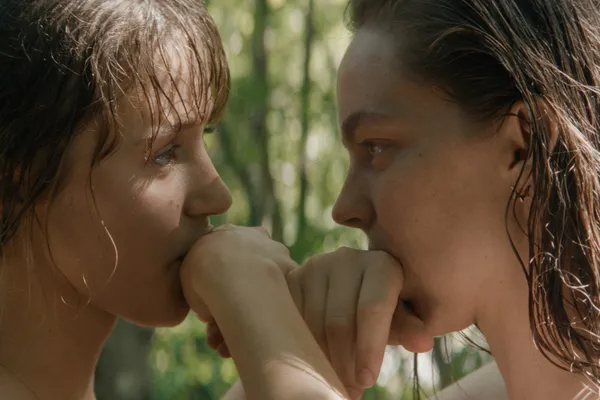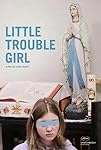Eye For Film >> Movies >> Little Trouble Girls (2025) Film Review
Little Trouble Girls
Reviewed by: Marko Stojiljkovic

Titled after a Sonic Youth song internationally and after a Slovenian traditional song on the domestic market, the Berlinale Perspectives opener and the debut feature of Urška Djukić – so far best known for her award-grabber animated short documentary Granny’s Sexual Life (2021) – does right by both of them. We hear Little Trouble Girls at the very end of the film as the only song not performed “in character”, just before we get the title printed out for the only time. The other song, Kaj Ti Je deklica? (“What’s Going On With You, Girl?”), however, we hear earlier on, at the culmination of slow-burning tension. And when it comes to sexual awakening in a society divided between the modern liberties and the religious and petit-bourgeois traditions, especially in a restrictive environment of a choir trip to a convent, the trouble for girls can come in a form of confusion.
Our point-of-view heroine is Lucija (Jara Sofija Ostan), the new girl in a Sunday school church choir. We meet her as she gets placed in the alto section next to the group’s “queen” Ana-Marija (Mina Švajger), who invites her to her “gang” through the “ceremony” of sharing the make-up. Lucija does not wear any because it is forbidden by her strict, but loving mother (Nataša Burger), and this is the first time we see a discrepancy between the 16-year-old girl and her immediate surroundings. She looks and dresses way more naively not just than tease Ana-Marija and her two sidekicks Klara (Staša Popović) and Uršula (Mateja Strle), but also than the rest of the girls in choir. However, while trying to bridge the gap between her and the environment, we are about to see a greater rift within Lucija herself…

It happens during the trip to a monastery in Cividale, Italy with the choir for a weekend or so of intensive rehearsals. Of course, it revolves around Lucija’s sexual awakening. Is she attracted to the beautiful and budding Ana-Marija who might be also attracted to her as well? Or is she fantasising about the nameless and often shirtless construction worker (Mattia Cason) she clearly enjoys spying on? Are the restrictions imposed on her by the Catholic upbringing so strong that she considers becoming a “bride of Christ”? Is sex shameful and sinful per se, or is it normal and healthy?
The trouble is she does not have anyone to confide to. Her mother is strict, her father is absent – we rather hear him snoring than actually see him. The choir conductor Bojan (Saša Tabaković) does not appear to be someone who could and would understand her position because he is a middle-aged mustachio dressed as a boy scout. The old Sister Magda from the convent offers only a tad more personal account of the possibility of celibate than it is written in the Sunday school textbooks. Finally, Lucija cannot be sure where she stands with Ana-Marija: is she her true friend, a legitimate love interest or someone in whose grace she is now and who can throw her under the bus?
Little Trouble Girls’ DNA could be traced to the early Céline Schiama films, especially in the off-beat, but perceptive script by the filmmaker and Maria Bohr that is often humorous and sometimes even a bit too understanding for the cruelty of the regular banter between the teenage girls.To an extent it also holds when it comes to Djukić’s directing approach that leaves space for the young non-professional actresses to explore their roles and interact with one another and the world around them.
The imagery is often potent on symbolic level, from the opening shot of a vulva-like motif on a tapestry to details of the girls’ ears, mouths, hands, gestures and facial expressions. The choice of a slightly boxy 3:2 aspect ratio combined with close-ups perfectly executed by the cinematographer Lev Predan Kowarski also seems as a bullseye hit. Along with Vladimir Gojun’s progressively rhythmic editing and Julij Zornik’s subjective sound design, the filmmaker takes us right into the protagonist’s, and therefore any and every teenager’s head.
It might seem messy, confusing, hormone-driven, risky and volatile, but it is true to the general sentiment of coming of age. Nothing much actually goes on in Little Trouble Girls, but its inner turmoil makes the film a captivating and emotional experience, resonating both on the personal and the universal level.
The film will be released in UK cinemas on August 29
Reviewed on: 18 Feb 2025

















